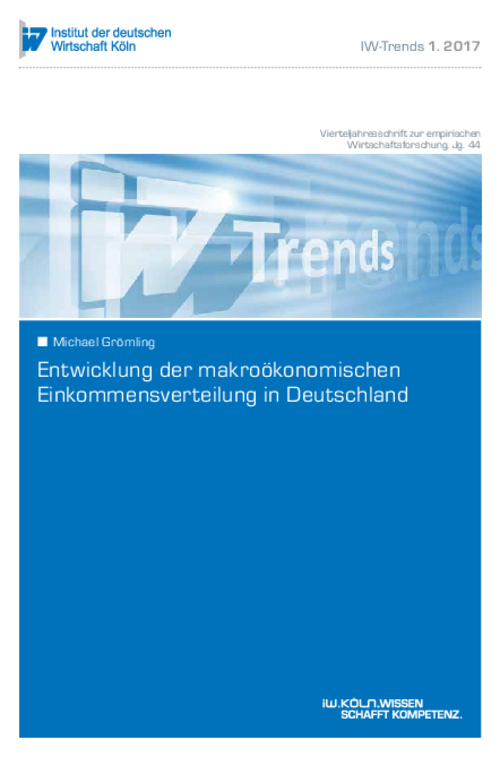Problems of economic growth and political polarisation in a number of developed economies are increasingly being blamed on inequality in distribution. Over the past decade this has stimulated analysis of macroeconomic income distribution.

The Development of Macroeconomic Income Distribution in Germany
IW-Trends

Problems of economic growth and political polarisation in a number of developed economies are increasingly being blamed on inequality in distribution. Over the past decade this has stimulated analysis of macroeconomic income distribution.
If there is a shift in national income creation towards capital income, this is bound to affect personal income distribution and how society perceives it. However, an international comparison of advanced countries over the last quarter-century shows no general or consistent fall in the labour share. Rather, among the 18 countries compared, no uniform pattern can be discerned. Apart from the effects of sometimes considerable fluctuation in the state of the economy, Germany had a stable labour share in the 1990s, and has had so again in recent years. When interpreting functional incomes and their distribution, attention needs to be paid to the limits and peculiarities of the underlying statistics, particularly with regard to corporate profits. The definition of employee compensation does not include the earned incomes of the self-employed, which are instead booked as corporate income. Moreover, the functional distribution of income provides a guide to the income position of private households. The sector accounts in the national account system indicate that the latter’s most recent share of Germany’s primary national income was 83 per cent.

Michael Grömling: Entwicklung der makroökonomischen Einkommensverteilung in Deutschland
IW-Trends

More on the topic

A Macroeconomic Analysis of Wage-Price Spirals
The subject of this Analysis is the forms that wage-price spirals can take and how they influence macroeconomic stability and inflationary trends in Germany.
IW
IW Distribution Report 2023: Attitudes towards social mobility
Fundamentally linked to the social market economy is the idea that everyone has the opportunity for social advancement, regardless of their social background, and that children should be better off than their parents.
IW